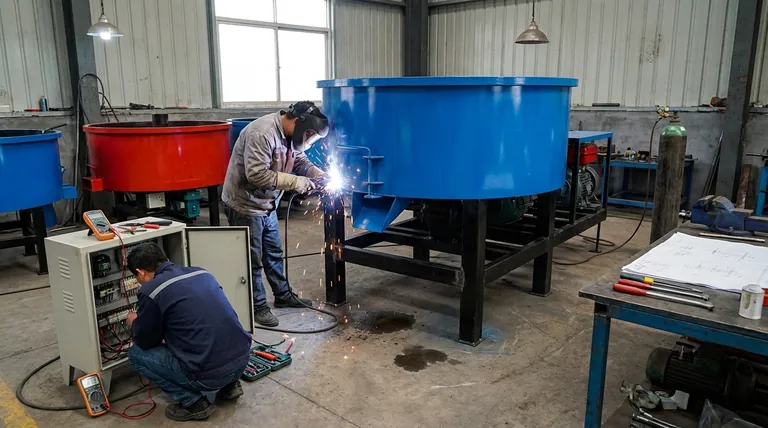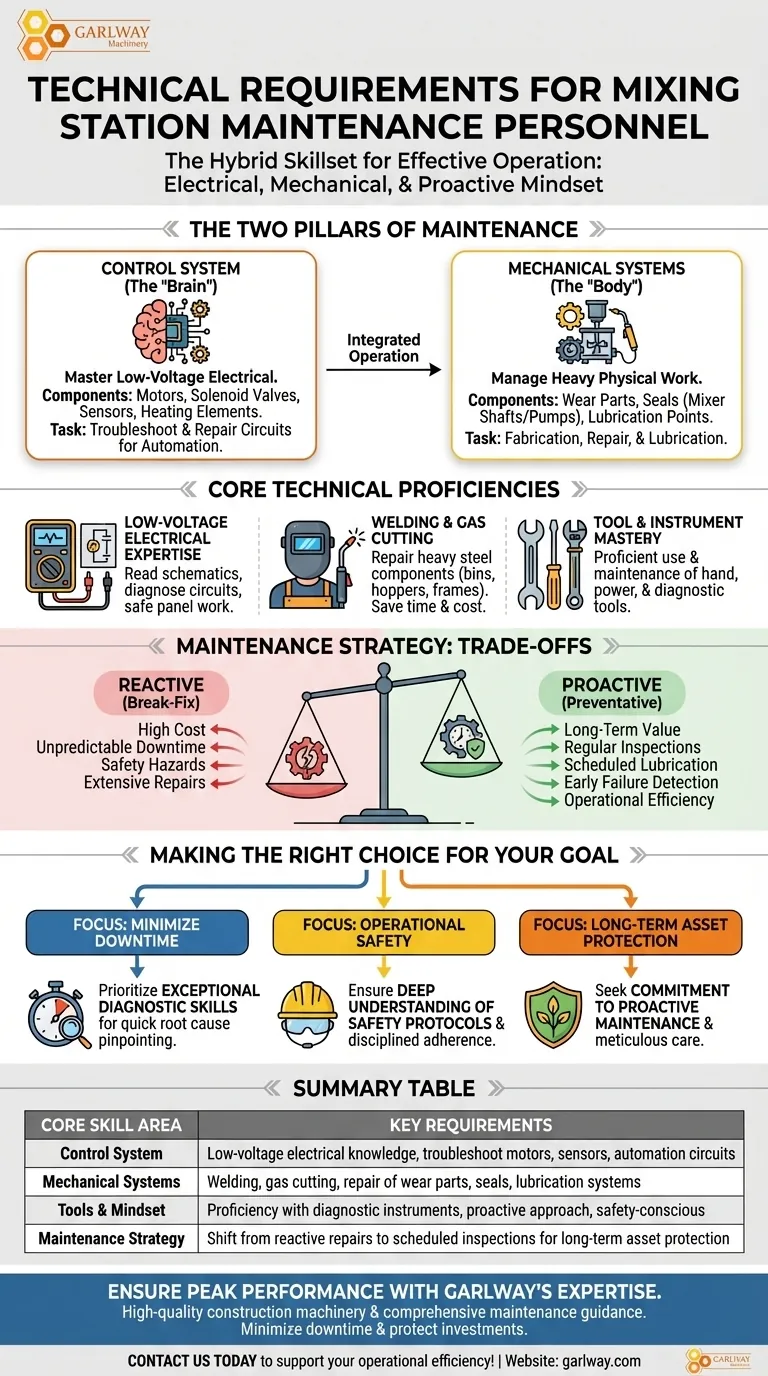To be effective, maintenance personnel for mixing station equipment must possess a hybrid skillset combining foundational knowledge of low-voltage electrical systems with proficiency in mechanical repair techniques like welding and gas cutting. This technical expertise must be paired with a proactive, safety-conscious mindset and the ability to skillfully use and maintain a variety of tools and instruments.
The role of a mixing station maintenance technician is not merely about fixing what's broken. It's about holistically managing a complex electromechanical system, where proactive maintenance is the key to ensuring safety, minimizing downtime, and protecting the equipment asset.

The Two Pillars of Mixing Station Maintenance
Mixing station equipment is fundamentally an integration of two distinct but interconnected systems. A competent technician must be proficient in maintaining both to ensure the entire operation runs smoothly.
Mastering the Control System
The control system is the "brain" of the mixing station. Maintenance here requires a solid grasp of low-voltage electrical principles.
Technicians work with essential components like motors, solenoid valves, sensors, and heating elements. Their primary responsibility is to troubleshoot and repair the electrical circuits and cables that power and control these parts, ensuring accurate and reliable automation.
Managing the Mechanical Systems
The mechanical part is the "body" of the station, performing the heavy physical work. This domain demands hands-on fabrication and repair skills.
Key areas of focus include wear-resistant parts inside the mixer, seals on mixer shafts and pumps, and the lubrication of all transmission points. This also extends to larger equipment like reducers and air compressors that support the primary operation.
Core Technical Proficiencies
Beyond understanding the two core systems, a technician must have specific, demonstrable skills to perform their duties effectively.
Low-Voltage Electrical Expertise
This is a non-negotiable requirement. The technician must be able to read schematics, diagnose faulty circuits, and safely work with the control panels that govern the entire station's operation.
Welding and Gas Cutting
Much of a mixing station is heavy steel. The ability to weld and cut metal is essential for repairing structural damage to components like aggregate bins, hoppers, and support frames, saving significant time and money compared to part replacement.
Tool and Instrument Mastery
A professional is defined by their tools. A skilled technician is not only proficient in using various hand tools, power tools, and diagnostic instruments but also understands the importance of keeping them in excellent working condition.
Understanding the Trade-offs: Proactive vs. Reactive Maintenance
A maintenance strategy is a choice between preventing failures and reacting to them. The skillset and mindset of your personnel directly influence which strategy you can effectively implement.
The High Cost of Reactive Repairs
A "break-fix" approach, where maintenance only occurs after a failure, leads to unpredictable and often catastrophic downtime. It halts production, can create safety hazards, and often results in more extensive and costly repairs.
The Long-Term Value of Proactive Maintenance
A technician with a proactive mindset focuses on regular inspections, scheduled lubrication, and identifying potential failures before they occur. This approach, supported by a deep understanding of the equipment, transforms maintenance from an emergency expense into a strategic investment in operational efficiency and safety.
Making the Right Choice for Your Goal
When hiring or training personnel, your operational priorities should guide your focus.
- If your primary focus is minimizing downtime: Prioritize technicians with exceptional diagnostic skills who can quickly and accurately pinpoint the root cause of both electrical and mechanical problems.
- If your primary focus is operational safety: Ensure your personnel have a deep-rooted understanding of safety protocols, especially for electrical work, and are disciplined enough to follow them without exception.
- If your primary focus is long-term asset protection: Seek individuals with a clear commitment to proactive, preventative maintenance who meticulously inspect and care for the machinery.
Ultimately, the right maintenance personnel are an investment in the reliability and longevity of your entire operation.
Summary Table:
| Core Skill Area | Key Requirements |
|---|---|
| Control System | Low-voltage electrical knowledge, ability to troubleshoot motors, sensors, and automation circuits |
| Mechanical Systems | Welding, gas cutting, repair of wear-resistant parts, seals, and lubrication systems |
| Tools & Mindset | Proficiency with diagnostic instruments, proactive maintenance approach, safety-conscious attitude |
| Maintenance Strategy | Shift from reactive repairs to scheduled inspections for long-term asset protection |
Ensure your mixing station operates at peak performance with GARLWAY's expertise. We specialize in providing high-quality construction machinery, including concrete batching plants and mixers, supported by comprehensive maintenance guidance. Our solutions help construction companies and contractors globally minimize downtime and protect their investments. Contact us today to discuss how we can support your operational efficiency and equipment longevity!
Visual Guide

Related Products
- Ready Mixer Machine for Construction Ready Mix Machinery
- Commercial Construction Mixer Machine for Soil Cement Mixing Concrete
- Portable Concrete Mixer Machine Equipment for Mixing Concrete
- Hydraulic Concrete Mixer Machine Cement Mixing Equipment for Mixture Concrete
- HZS75 Concrete Batching Plant Cement Mixer Price Concrete Mixer Bunnings Mixing Plant
People Also Ask
- What are the differences between automatic and manual weighing equipment in concrete mixing plants? Boost Efficiency & Quality
- How are aggregates transported in a concrete batching plant? Ensuring Precision and Efficiency in Concrete Production
- What measures are required to reduce dust pollution in the plant area of a concrete mixing station? Implement a Layered Strategy for Cleaner Operations
- How do the control room and system main software contribute to a concrete batching plant's operation? The Brain for Quality & Efficiency
- What is the function of the control system in a concrete batching plant? Master Quality, Efficiency, and Cost Control
- How should oil pools and tanks in concrete mixing stations be maintained? Prevent Costly Downtime
- What is the function of aggregate feeders in a concrete batch plant? The Key to Precise Concrete Mixing
- What are some innovations in volumetric concrete mixers? Boost Efficiency with On-Demand Production
















